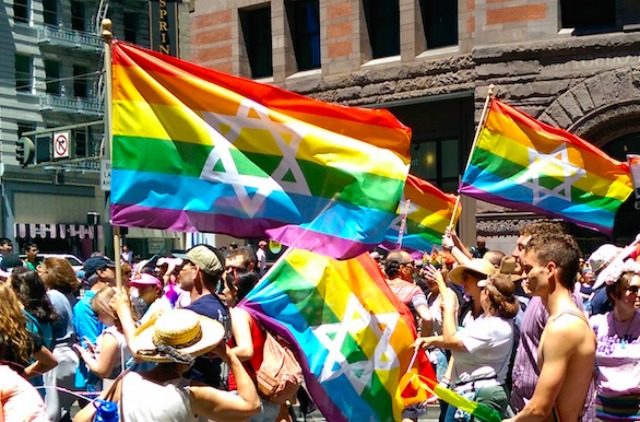 The flag in question looked like this. Via WikiCommons
The flag in question looked like this. Via WikiCommons This is a message for those heroes in the LGBTQ community, not just for my friends and my family members and my students, but for those brave souls who I’ve never met but who I admire and applaud and do my best to support. I am a cisgender straight white man who wants to help however I can. But some of you are making it a lot harder than it needs to be.
As near as I can tell, the problem is that I’m also a Zionist. I believe in the safety and security of the state of Israel, and I’ve now learned that those convictions make me unwelcome in some circles within the Rainbow community. Earlier this month, a major Pride Weekend event in Washington, D.C., attempted to ban marchers who carried rainbow flags that included a Star of David. Thanks to the efforts of the leaders of Jewish organizations such as Zioness and A Wider Bridge, a compromise was reached that allowed a small number of participants to carry Jewish Pride flags, but only after days of acrimony and anti-Semitic ugliness.
The organizers of the Washington march argued that their problem was not with Jews but with Israel, a familiar refrain for those who promote the boycott, divestment and sanctions movement on college campuses and state party conventions in recent years. They refused to allow flags from countries with “specific oppressive tendencies,” explicitly calling out Israel and the United States but not those of Iran, Saudi Arabia, Yemen, Nigeria, Sudan and Somalia, all of which impose the death penalty for consensual same-sex acts.
“Concepts like inclusion, respect and solidarity are most useful on two-way streets.”
The ban was then broadened to exclude flags of all nations. However, the Palestinian flag was allowed, under the tortured logic that Palestine is not yet a nation. But others involved in the event’s planning made it clear that their march was a “pro-Palestinian space” and that the inclusion of a flag with a symbol so closely associated with the state of Israel could be discomforting to Palestinian participants. There did not appear to be any similar consideration for the sensitivity of Jewish marchers, who weren’t asked their thoughts on whether a march for human rights should include the flag of a movement that celebrates the death of innocent Israeli children at the hands of terrorists.
In addition to broad support among Jewish Americans for equal rights and legal protections for LGBTQ individuals, Israel banned discrimination on the grounds of sexual orientation almost 30 years ago, and permits open military service, legal sex change and same-sex couples’ adoption. By contrast, homosexuality is still illegal in Gaza and there are still no laws in the Palestinian territories that offer protections of any kind against discrimination or harassment of gays.
The conclusion is that the stated purpose of this Pride event was less important to its organizers than the demonization of Israel. The challenges that pro-Israel voices face in progressive circles have been well-chronicled in this space and elsewhere (as have the equally pernicious threats that Jews face from the far right). So it appears that the effort to achieve LGBTQ equality has become just one more front in the fight against Israel in leftist circles.
It’s important to recognize that the organizers of the Washington event don’t represent the mainstream of the LGBTQ community, and at least one national organization disassociated itself from the Washington march because of the controversy. The Jewish activists who fought for the inclusion of themselves and their flag in the march deserve tremendous credit as well. But forcing those who want to demonstrate gay pride and their Jewish homeland to choose between them is going to lead to a lot of undesirable and unnecessary outcomes.
Those who would vilify me for wanting to support their goals while carrying a Star of David will ultimately have to learn that concepts like inclusion, respect and solidarity are most useful on two-way streets. You don’t have to agree with me on every issue in order to accept my support on those matters that are most important to you. But you don’t get to hate me for my identity and my allegiances and still expect me to stand with you for yours.
Dan Schnur is a professor at USC’s Annenberg School for Communication and Journalism and Pepperdine University.























 More news and opinions than at a Shabbat dinner, right in your inbox.
More news and opinions than at a Shabbat dinner, right in your inbox.